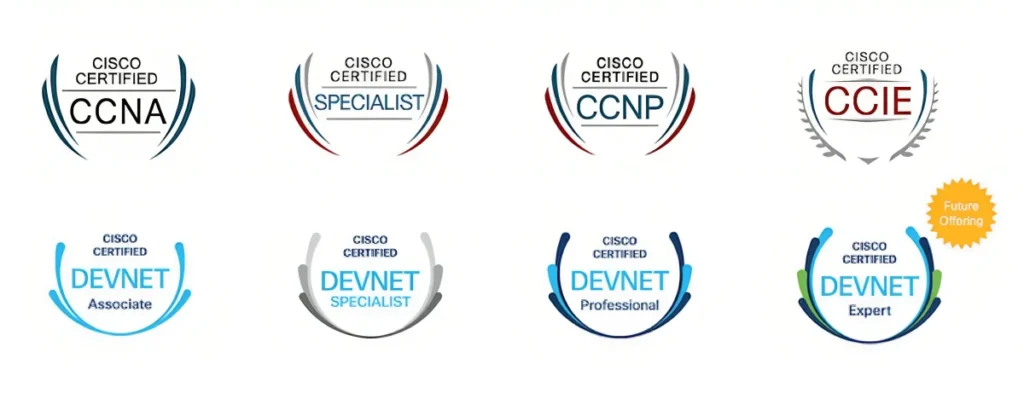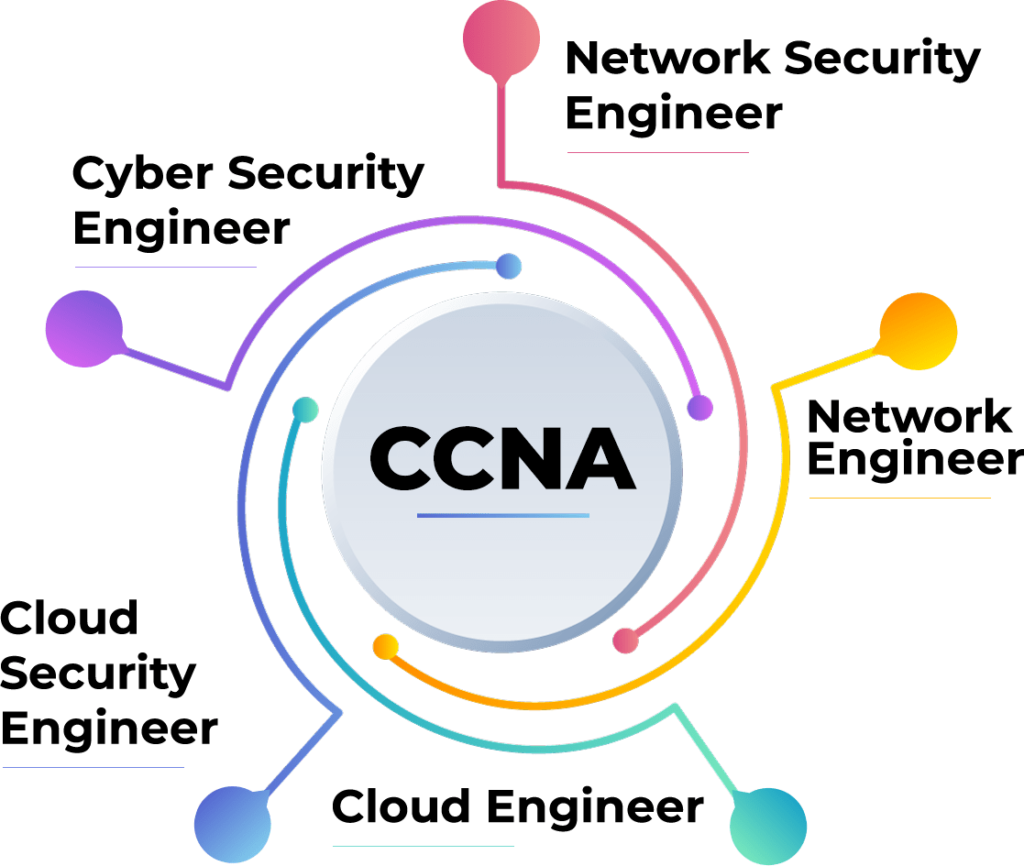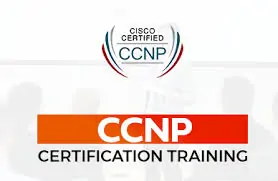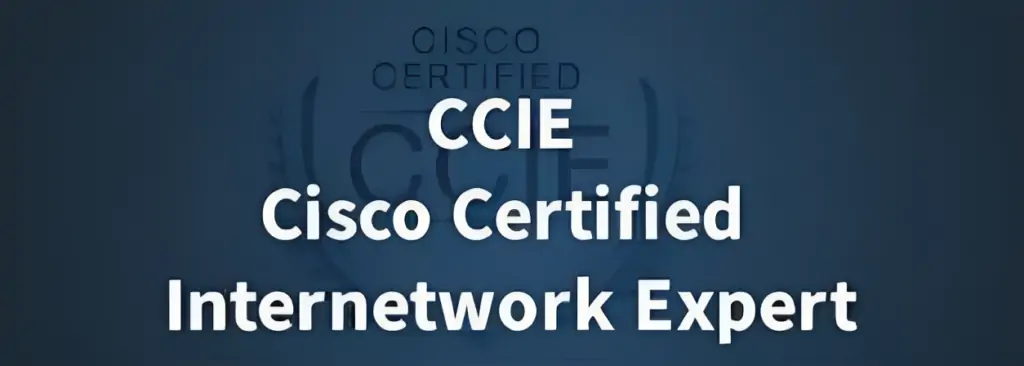Unlock success with our ultimate guide to networking certification training. Master the skills needed to excel in the field of Networking.

Introduction
In today’s digitally inter-connected world, networking has become the backbone of businesses and organizations. Whether you are looking to advance your career or enhance your knowledge in the field of networking, obtaining a certification is a crucial step. The CCNA (Cisco Certified Network Associate), CCNP (Cisco Certified Network Professional), and CCIE (Cisco Certified Inter-network Expert) certifications are among the best in the networking industry, offering expertise from foundational to advanced levels. This comprehensive guide will take you through everything you need to know about CCNA, CCNP and CCIE certification training and provide valuable insights into the world of networking.
Understanding Networking Certification
Networking certification is a structured process that validates your knowledge and skills in various aspects of networking, such as network design, implementation, security, and troubleshooting. These certifications are offered by renowned organizations and serve as a testament to your proficiency in the field. One of the most sought after networking certifications is the Cisco Certified Network Associate (CCNA) certification.
Why Networking Certification Matters
1. Career Advancement: Earning a networking certification can significantly boost your career prospects. Many employers prioritize candidates with certifications, as they demonstrate a commitment to professional development and expertise.
2. Industry Recognition: Certifications from reputable organizations like Cisco are widely recognized and respected in the industry. They carry weight and prestige that can open doors to exciting job opportunities.
3. Skill Validation: Networking certifications validate your skills and knowledge. They prove that you have the competence to manage, troubleshoot, and secure network infrastructures effectively.
Types of Networking Certifications
There is a plethora of networking certifications available, catering to various aspects of networking. Here are a few notable ones:
Cisco Certified Network Associate (CCNA): CCNA certification is a fundamental certification offered by Cisco. It covers essential networking skills, including routing, switching, security, and wireless technologies.
Cisco Certified Network Professional (CCNP): CCNP is an advanced certification that dives deeper into networking topics, offering specializations such as Routing and Switching, Security, Data Center, and more.
Cisco Certified Inter-network Expert (CCIE): CCIE is designed for IT professionals who aspire to become experts in networking.
CompTIA Network+: Network+ is a vendor-neutral certification that provides a solid foundation in networking concepts, making it suitable for beginners.
Certified Information Systems Security Professional (CISSP): While primarily focused on security, CISSP covers networking extensively, especially in the context of cybersecurity.
Juniper Networks Certified Internet Associate (JNCIA): Juniper’s certification focuses on their networking equipment and protocols.
Choosing the Right Certification
Selecting the right networking certification depends on your career goals, interests, and current skill level. Consider the following factors:
Career Goals: Are you aiming for a specific job role, such as network engineer, security analyst, or network administrator?
Experience: Your level of experience in networking can determine whether you should start with a foundational certification like CCNA or proceed to an advanced one like CCNP.
Vendor Preference: If you have a preference for specific networking equipment or solutions (e.g., Cisco, Juniper), choose a certification aligned with that vendor.
Specialization: If you are interested in a particular niche within networking (e.g., cyber security, cloud networking), look for certifications that offer relevant specializations.
Your Networking Certification Journey
To embark on your networking certification journey, follow these steps:
Set Clear Goals: Define your career objectives and determine which certification(s) will help you achieve them.
Study Materials: Invest in quality study materials, such as official certification guides, practice exams, and online courses.
Hands-On Practice: Gain practical experience by setting up networking labs or using simulation software.
Join a Community: Connect with fellow certification seekers and professionals on online forums and networking communities. They can provide guidance and support.
Exam Preparation: Create a study schedule, stick to it, and use practice exams to assess your readiness.
What Is CCNA Certification?
CCNA or Cisco Certified Network Associate, is a well recognized and respected certification in the field of networking. It is offered by Cisco, a global leader in networking solutions. CCNA certification demonstrates your ability to install, configure, operate, and troubleshoot medium sized routed and switched networks.

Why Choose CCNA Certification?
Industry Recognition : Cisco is a trusted name in networking, and CCNA certification carries a lot of importance in the industry. Employers often prefer candidates with Cisco certifications.
Comprehensive Skills: CCNA covers a wide range of networking topics, including routing, switching, security, and wireless technologies. This makes you a good networking professional.
Career Advancement: CCNA is a stepping stone to more certifications like CCNP (Cisco Certified Network Professional) and CCIE (Cisco Certified Internetwork Expert). this offers to achieve success in life.
CCNA Certification Requirements
1. Basic knowledge of networking concepts.
2. A strong foundation in TCP/IP.
3. Familiarity with Cisco devices and their operation.
CCNA Certification Training:
1. Enroll in a CCNA Course: To start your CCNA journey, find a reputable CCNA course website that offers Best training materials and resources.
2. Self-Study or Boot Camp: Depending on your learning style and schedule, you can choose between self study or attending a CCNA boot camp. Both options have their advantages, so select what suits you best.
3. Online Resources: Explore CCNA certification training material is available online, including practice exams, video tutorials, and study guides.
CCNA Certification Cost:
Training materials and courses: The cost of training materials and courses can vary widely, depending on whether you choose self study options, online courses, or in-person classes. Prices typically range from $100 to $1,000 or more.
Exam fees: The CCNA exam fee is approximately $300. It is important to note that fees may vary by location and can be subject to change, so it is advisable to check Cisco’s official website for the most up to date pricing information.
Study resources: Additional study resources such as textbooks, practice labs, and online study platforms can add an extra $100 to $500 to your overall cost.
Practice exams: Purchasing practice exams or study guides can cost around $50 to $150, depending on the provider and the number of resources you choose.
Be sure to check the latest pricing on the official Cisco website and factor in any additional expenses.
CCNA Exam Preparation:
Passing the CCNA exam required perfect preparation. Here are some tips to help you succeed:
Create a Study Plan: Outline a study schedule that covers all exam topics systematically.
Use Official Study Materials: Utilize official CCNA study guides and materials to ensure you are learning the right content.
Practice, Practice, Practice: Take practice exams to assess your knowledge and identify weak areas.
Hands-On Experience: If possible, get hands-on experience with Cisco equipment to reinforce your skills.
What Is CCNP Certification?
CCNP is an advanced-level certification offered by Cisco. It is designed for network professionals who want to demonstrate their expertise in planning, implementing, verifying, and troubleshooting complex network solutions.

Benefits of CCNP Certification
1. Specialization: CCNP offers various specializations such as Routing and Switching, Security, Data Center, and more. You can choose the path that aligns with your career goals.
2. Higher Earning Potential: CCNP certified professionals typically earn higher salaries due to their advanced skills and knowledge.
3. Career Opportunities: CCNP opens doors to senior networking roles, making you a valuable asset to organizations.
CCNP Certification Requirements
To pursue CCNP Certification, you must complete the following requirements:
Prerequisite: You should have a valid Cisco CCNA certification or any Cisco Certified Inter-network Expert (CCIE) certification. The CCNA certification can be in any field, such as CCNA Routing and Switching, CCNA Security, CCNA Data Center, etc.
Core Exam: Pass one core exam of your choice. The core exam serves as the foundation of your CCNP certification and covers essential topics.
Concentration Exams: Choose and pass one concentration exam from a list of available options. Concentration exams allow you to specialize in specific areas of networking that align with your career goals and interests.
Certification Renewal: CCNP certifications are valid for three years. To keep your certification active, you must participate in the Cisco Continuing Education Program or pass a re-certification exam before the certification expiration date.
Continuous Learning: Stay updated with the latest networking technologies and trends. Engage in ongoing learning and professional development to maintain your expertise.
CCNP Certification Training
To prepare for CCNP certification, you should consider the following steps:
- Select a CCNP Course: Look for a reputable CCNP course website that provides in-depth training and materials specific to your chosen specialization.
- Study Material: Utilize official CCNP study materials, books, and practice exams to ensure you are well prepared.
- Hands-On Labs: Practice is key to success. Use Cisco’s Packet Tracer or actual equipment if available to gain hands-on experience.
- Online Resources: Explore online forums and communities where you can connect with other CCNP candidates and seek guidance.
CCNP Certification Cost
The cost of CCNP certification varies based on the specialization you choose and the resources you use for preparation. It typically includes exam fees, study materials, and possibly lab equipment if you opt for hands-on practice.
CCNP Exam Preparation
Study Plan: Develop a detailed study plan that covers all topics within your chosen specialization.
Official Study Guides: Rely on official Cisco study guides and practice exams to ensure you are aligned with the exam objectives.
Practice Labs: If possible, set up lab environments to gain practical experience in configuring and troubleshooting network solutions.
Mock Exams: Take advantage of practice exams to assess your knowledge and readiness for the real CCNP exams.
Understanding CCIE Certification
The CCIE certification, offered by Cisco Systems, is designed for IT professionals who aspire to become experts in networking. It focuses on advanced skills, in-depth knowledge, and hands-on experience in various networking technologies, making it one of the most prestigious and sought-after certifications globally.

Why CCIE Certification Matters:
-
Unmatched Expertise: CCIE certified professionals are considered masters of their craft. They possess an unparalleled depth of knowledge in networking technologies, making them indispensable to organizations.
-
Industry Recognition: The CCIE certification is globally recognized and respected. It demonstrates your commitment to excellence in networking and sets you apart from other IT professionals.
-
Career Advancement: CCIE certification can lead to lucrative job opportunities and career advancement. It is a key differentiator that can help you secure high-paying roles in the IT industry.
-
Complex Problem Solving: CCIEs are trained to handle complex network issues and troubleshoot effectively, ensuring network stability and security.
The Journey to CCIE Certification:
Becoming a CCIE certified expert is not for the faint of heart. It requires dedication, hard work, and a systematic approach. Here is a glimpse of what the journey entails:
-
Prerequisites: To pursue CCIE certification, you typically need a solid foundation in networking and should have earned your CCNA and CCNP certifications. However, prerequisites can vary depending on the track.
-
Choose Your Track: Select the CCIE track that aligns with your career goals and interests.
-
Training: Enroll in a reputable CCIE training program or course. Look for institutions that offer hands-on labs and expert instructors.
-
Hands-On Practice: Gain practical experience by working with Cisco devices and technologies. Hands-on labs are crucial for mastering the skills required for the exam.
-
Study Materials: Invest in official Cisco study guides, practice exams, and other materials to supplement your training.
-
Exam Preparation: Create a study plan, schedule regular practice exams, and work on areas where you need improvement.
-
Written and Lab Exams: CCIE certification consists of a written exam followed by a hands-on lab exam. The lab exam is a grueling eight-hour practical test that assesses your ability to configure and troubleshoot complex network scenarios.
-
Continuous Learning: CCIE certification holders must stay updated with the latest technologies and trends by participating in continuing education programs.
Why Choose Bluemorpho for Networking Certification
BlueMorpho Learning Solutions is your ideal partner for achieving networking certification success. Here is why:
1. Comprehensive Course Offerings: We offer a wide range of networking certification courses, including CCNA and CCNP, tailored to meet your specific career goals and interests.
2. Experienced Instructors: Our instructors are industry experts with years of experience in networking. They bring real-world knowledge to the classroom, ensuring that you receive practical insights and guidance.
3. Hands-On Learning: We believe in learning by doing. Our courses include hands-on labs and simulations to provide you with practical experience and confidence in handling real-world networking challenges.
4. Flexible Learning Options: Whether you prefer self-paced online courses or interactive live sessions, we have a variety of learning options to accommodate your schedule and learning style.
5. Exam Preparation: We provide comprehensive exam preparation resources, including practice tests and study materials, to ensure you are well prepared to pass your certification exams.
6. Career Support: BlueMorpho does not stop at certification. We also offer career support services, including resume building, interview coaching, and job placement assistance, to help you launch or advance your networking career.
The BlueMorpho Learning Advantage:
At BlueMorpho Learning Solutions, we understand that achieving a networking certification is not just about passing an exam; it is about building a foundation for a successful and rewarding career. Our commitment to your success goes beyond the classroom. We are dedicated to equipping you with the skills, knowledge, and confidence to excel in the dynamic world of networking.
Conclusion
In conclusion, networking certifications, particularly the CCNA, CCNP, and CCIE, are invaluable assets for IT professionals in the ever-evolving world of networking. The CCNA lays the foundation, providing a strong understanding of networking fundamentals. The CCNP takes you to the next level, allowing specialization in various networking domains, while the prestigious CCIE represents the pinnacle of expertise.
These certifications open doors to exciting career opportunities, validating your knowledge and skills in network design, implementation, and troubleshooting. Whether you are aiming for a solid entry into the field or looking to reach the highest echelons of networking mastery, Cisco’s certification programs offer a clear path.
Keep in mind that the networking landscape is continually evolving, so staying updated with the latest technologies and trends is vital. The journey does not end with certification; it is a commitment to lifelong learning and staying at the forefront of the networking industry.
So, whether you are a network enthusiast just starting out or a seasoned professional seeking to enhance your skills, Cisco’s networking certifications are your roadmap to success in this dynamic and crucial field.
